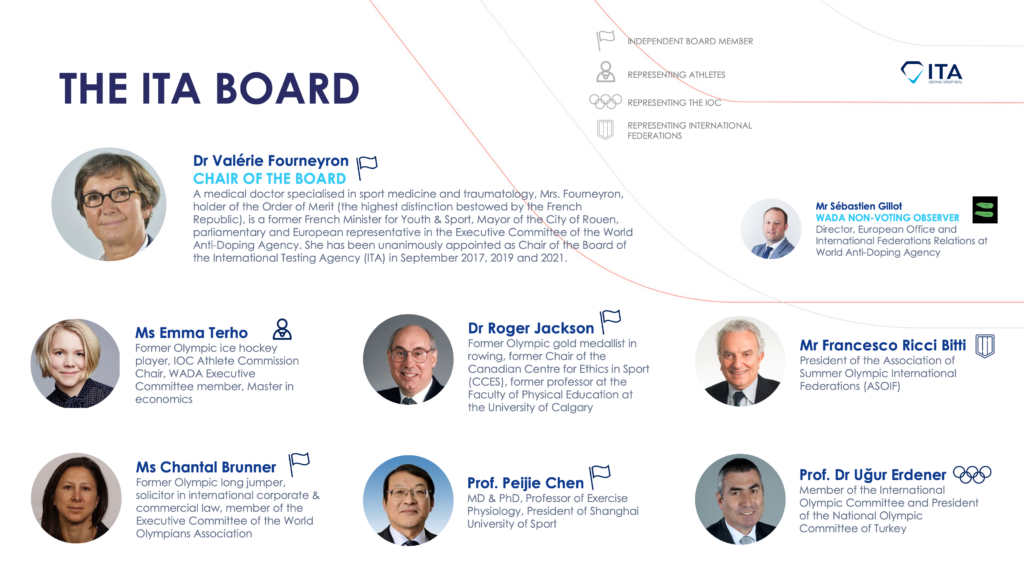Menu
We are always working to support journalists with relevant and up-to-date information on the International Testing Agency and our activities. Please find our latest announcements in our news section.
Subscribe to our distribution list and receive ITA announcements in your mailbox – register here.
Subscribe to the ITA’s WhatsApp channel and receive our news, including results management updates throughout the year and during major events, directly on your phone.
Find more information about the ITA Anti-Doping Program for Milano Cortina 2026 here.
Marta Nawrocka
ITA Head of Communication
[email protected] – [email protected]
+41 78 330 96 46
Access here our download centre with logos, images and video b-roll.
The International Testing Agency (ITA) is an international organisation constituted as a not-for-profit foundation, based in Lausanne, Switzerland. Its mission is to manage anti-doping programs, independent from sporting or political powers, for International Federations (IFs), Major Event Organisers (MEOs) and all other anti-doping organisations requesting support.

The ITA is the result of a desire for a united and independent approach to keeping sport clean – free of any perceived or actual conflict of interest.
The following are the key events leading to the foundation of the ITA:
Yes, the ITA provides independent anti-doping programs to over 60 partners. Independence is one of the organisation’s main principles as the ITA was created to reduce real or potential conflicts of interest in anti-doping.
The ITA’s independence relies on the following main pillars:

The ITA is partnering with over 60 International Federations and Major Event Organisers.
You can find more information on who those partners are and what activities the ITA is managing on their behalf in our partner section.

The International Testing Agency (ITA) itself is not a Signatory of the World Anti-Doping Code.
Code Signatories are International Federations (IFs), Major Event Organisers (MEOs), National/Regional Anti-Doping Organisations (NADOs/RADOs) and National Olympic Committees (NOCs).
The ITA implements comprehensive, expert-led anti-doping programs or parts of these programs on behalf of Code Signatories in strict compliance with the World Anti-Doping Code and its connected International Standards.
The ITA offers the full range of activities required to run comprehensive anti-doping programs for our partners. You can find more information on our range of expertise here.
Next to our work for our partners’ individual clean sport programs, we also support global anti-doping efforts through various initiatives:
The amount of doping controls that the ITA implements each year depends on the volume of its partnerships and the level of the delegation of its partners’ anti-doping programs.
The ITA is an independent international organisation that manages comprehensive anti-doping programs for International Federations, Major Event Organisers and any other organisations, in line with the WADA Code and Standards. The ITA’s activities include testing, education, results management, intelligence & investigations, science & medical services, among others.
The World Anti-Doping Agency’s (WADA’s) primary role is to develop, harmonise and coordinate anti-doping rules and policies across all sports and countries. Their key activities include ensuring and monitoring the effective implementation of the World Anti-Doping Code and the International Standards, scientific research and accreditation of laboratories, education and social science research, intelligence and investigations, results management and building anti-doping capacity with anti-doping organisations worldwide.
In short, the ITA implements anti-doping programs, including testing, in compliance with WADA’s guidelines and standards. As a governing body, WADA does not implement anti-doping programs for Code Signatories.
More information on the roles of various stakeholders in the anti-doping system can be found in the following video:
As per the World Anti-Doping Code (Code), it is only mandatory to publish anti-doping rule violations once those are confirmed and sanctions are imposed. The Code provides limited instances, such as cases involving protected athletes, minors, recreational athletes and exceptional cases involving substantial assistance, where public disclosure of the existence of a confirmed Anti-Doping Rule Violation is not mandatory.
In furtherance of its commitment to transparency, but whilst taking into consideration the athletes’ and other individuals’ data privacy rights, the ITA, on behalf of its partners, has decided to also publicly disclose cases at an earlier stage, i.e. when potential anti-doping rule violation trigger the imposition of a provisional suspension. Potential cases where a provisional suspension is not required as per the International Federation’s anti-doping rules will not be disclosed until the case is confirmed and sanctions are imposed. This is also allowed by the World Anti-Doping Code.
The ITA may however decide not to proactively disclose a potential Anti-Doping Rule Violation for various factors, such as the involvement of a minor, protected person or recreational athletes and other circumstances where proactive disclosure would not be warranted, which may include, amongst others, the likelihood of having the case covered by a therapeutic use exemption, the case involving a substance of abuse, additional ongoing investigations, discussions around substantial assistance.
Lastly, as required by the Code, sanctions are to be removed either, after one month (for cases where there is no period of ineligibility, or the suspension has already expired by the time the case is resolved) or once the period of ineligibility is finished.
With respect to providing comments or additional information when requested by media representatives or other interested parties, the ITA is also required to consider that the World Anti-Doping Code prohibits any comments on ongoing proceedings or investigations beyond the information provided at the announcement of a Provisional Suspension or none if there is no public disclosure. Other potentially limiting factors are noted above. The ITA recognises this legal framework, but is also committed to public transparency and will provide appropriate levels of information whenever possible.